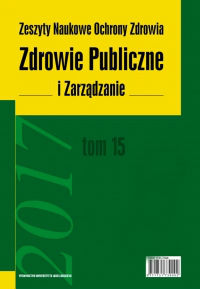Measuring the waiting time to pregnancy with the use of a retrospective questionnaire in the course of the GGS-PL study entitled ‘generations and gender survey’
Measuring the waiting time to pregnancy with the use of a retrospective questionnaire in the course of the GGS-PL study entitled ‘generations and gender survey’
Author(s): Krzysztof TymickiSubject(s): Health and medicine and law
Published by: Wydawnictwo Uniwersytetu Jagiellońskiego
Keywords: bezdzietność; ciąża; czas oczekiwania na ciążę; dzietność; płodność; odraczanie macierzyństwa; zapłodnienie
Summary/Abstract: Paper analyses relationship between age at first attempt to conceive and apparent fecundability defined as detection of a pregnancy. The purpose of the analysis is to account for biological consequences of age shifts on fertility schedules in contemporary low fertility societies. Age specific decrease in fecundability might lead to increase in waiting time to pregnancy measured as interval between onset of deliberate attempt to conceive and actual pregnancy. Analysis is based on retrospective measurement of waiting time to pregnancy (WtP) implemented in GGS-PL survey. Analyses reveal significant increase in WtP among women aged 35+ and only a slight increase for those aged 30–35. Due to increase in age at first reproduction we expect that share of couples having prolonged WtP or those remaining childless might increase in the future especially among social groups which are in the avant-garde of fertility postponement. Paper addresses an issue whether increase in age at first attempt to conceive among females might have an effect on likelihood of conception. Since postponement of reproduction seems to be almost universal feature of contemporary developed societies paper aims at measuring safe limits of postponement in which conception will not be endangered by a significant drop in fecundity. Analysis uses data on waiting time to pregnancy (WtP) to measure an impact of reproductive ageing on length of interval between first attempt to conceive and conception. Methodology of measuring WtP has been implemented in Polish GGS survey. Analyses reveal significant increase in WtP among women aged 35+, slight increase among females aged 30–35 and no decrease for younger females. Results suggest that postponement of reproduction beyond age 35 might decrease chances for achieving desired number of children during lifetime and ultimately increase observed proportion of childless females. Paper addresses an issue whether decrease in female fecundity (reproductive senescence) during life cycle might have an influence on realization of fertility intentions. Increasing age at first attempt to conceive might translate into lower than planned number of offspring due to divergence between lifecycle of modern females and changes in fecundity over the life course. We use waiting time to pregnancy (WtP) to account for impact of reproductive ageing on length of interval between first attempt to conceive a child and actual pregnancy. This retrospective methodology reflects definition of sub-fertility and infecundity as number of months with regular unprotected intercourse ending (or not) in pregnancy. Methodology of measuring WtP has been implemented in Polish GGS survey and contains questions about infertility and number of menstrual cycles needed for conception. Analyses reveal significant increase in WtP among women aged 35+, slight increase among females aged 30–35 and no decrease for younger females. Estimates of infertility yields around 6% for females and around 3% for males (as declared by respondents). These results are in line with results of other studies which suggest that postponement of reproduction beyond age of 35 might influence probability of conception (as well as transition to higher parities) and increase chance of remaining childless. Taking into account age patterns of fertility in Poland, reproductive senescence might not have a great impact on realization of fertility intentions on the level of general population. However, due to increase in age at first reproduction we expect that share of couples having problems with conception (prolonged WtP) might increase in the future especially among social groups which are in the avant-garde of fertility postponement.
Journal: Zdrowie Publiczne i Zarządzanie
- Issue Year: 15/2017
- Issue No: 2
- Page Range: 161-171
- Page Count: 11
- Language: English

